News
TNA unveils its constitutional proposals
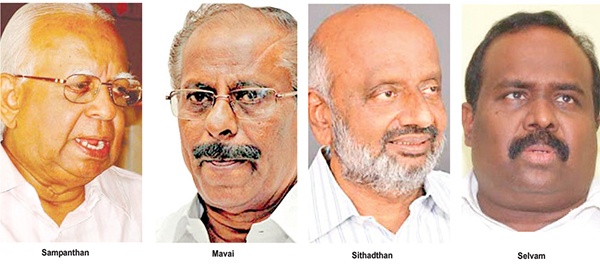
The TNA has called upon the Experts Committee to Draft a new Constitution to adhere to the following principles:
1. Nature of the State:
(1) Sri Lanka (Ceylon) shall be recognised as a free, sovereign, independent and united Republic comprising the institutions of the Centre and of the Regions, which shall exercise powers of governance as laid down in the Constitution.
(2) One of the Regions shall be for the territory predominantly occupied by the Tamil-speaking peoples in the North-East.
2. Fundamental Rights:
The Constitution shall include a comprehensive list of fundamental rights and freedoms, founded on human dignity and personal autonomy, and reflecting the full gamut of Sri Lanka’s international human rights obligations.
3. Language:
(1) The Constitution shall recognise Sinhala, Tamil, and English as the official languages throughout Sri Lanka, and the languages of administration in the entire island.
(2) Citizens should have a right to interact with the State, whether in person or in correspondence, in the language of their choice.
(3) The Constitution should specify that official documents, notices or directives which communicate, imply or impose a penalty or fine or punishment have no force or effect in law in the event they are issued in violation of language rights.
4. The Executive:
(1)The Constitution shall provide for a government with a ceremonial President who is accountable to Parliament, and who acts on the advice of the Prime Minister. The Prime Minister shall be the head of the cabinet of ministers.
(2
)The cabinet of ministers, the state ministers, and the deputy ministers, shall be appointed by the President on the advice of the Prime Minister from amongst members of Parliament. Assignment of subjects and functions shall be within the powers of the Prime Minister, and these powers may be exercised by the Prime Minister at any time.
5. The Legislature:
(1) The Constitution shall provide for a bicameral legislature with a chamber comprising members directly elected by the people, and a second chamber comprising representatives of the Regions.
(2) Legislation shall be passed upon passage of a Bill by simple majority through both chambers, except in the case of amendments to the Constitution, in which case, the Bill shall be passed with a two-thirds majority in both chambers. And in the case of amendments affecting devolution to the Regions, it shall have an additional requirement of assent by every one of the delegations from the Regions to the second chamber.
6. Sharing of Powers of Governance:
(1) There shall be Regional Councils for every Region, as defined in a schedule to the Constitution.
(2) There shall be a Governor for each Region, who shall be appointed by the President on the advice of the Chief Minister of the relevant Regional Council, and such advice shall only be given with the approval of the Regional Council.
(3) The Governor shall, except as provided in the Constitution, act on the advice of the Chief Minister and the cabinet of ministers of the Regional Council.
(4) Regional Councils shall have legislative power over subjects specified in a schedule to the Constitution. The statutes duly enacted by a Regional Council shall prevail over all previous legislation on the same subject with respect to the relevant region.
(5) Suitable time-bound arrangements shall be made with regard to Governor’s assent to statutes to avoid delay.
(6) National policy on a devolved subject defeats the object of devolution. Therefore, all Regions must be consulted and where all Regions agree, national policy must be confined to framework legislation within which Regions can exercise fully legislative and executive power pertaining to the devolved subject. Framework legislation shall not curtail devolved power.
(7) The Central Legislature may make laws with respect to subjects devolved to the Regional Councils, provided all Regional Councils vote to approve the said Bill. Where a Regional Council does not so approve, the Act, if passed, shall not have force or effect within the said Region.
(8) Devolved power cannot be overridden or taken back without the consent of the Region concerned. In the case of Constitutional amendments affecting devolution, it should have the approval of every regional delegation from the Regions in addition to two third majority votes in both Houses.
(9) Assignment of subjects and functions shall be based on the principle of maximum possible devolution. All subjects other than such subjects as must necessarily be with the Central Government, such as national security, national defence, armed forces, foreign affairs, and national economic affairs, must be devolved.
(10) Some of the important subjects and functions to be devolved shall include (but not be limited to):
a. land;
b. law and order;
c. education including tertiary education;
d. health;
e. housing and construction;
f. agriculture and agrarian services;
g. irrigation;
h. fisheries;
i. animal husbandry and livestock development;
j. resettlement and rehabilitation;
k. local government;
1. regional public service;
m. regional police service;
n. religious and cultural affairs;
p. all other socioeconomic and cultural matters;
o. cooperatives and cooperative banks;
q. industries; and
r. taxation, central grants, international and domestic loans and grants, and foreign direct investment.
(11) All appointments to the regional public service and regional police service, other than the Chief Secretary and other secretaries to regional ministries, shall be made by the Regional Public Service Commission and the Regional Police Commission, as the case may be, which shall be answerable and responsible to the Chief Minister and to the cabinet of ministers of the relevant Region.
(12) The Chief Secretary shall be appointed by the President with the concurrence of the Chief Minister of the Region, and shall be removable by the President on the advice of the Chief Minister. Secretaries to regional ministries shall be appointed by the Governor on the recommendation of the Chief Minister and the cabinet of ministers of the relevant Region, and shall be removable on their advice.
(13) There shall be adequate provision made in the Constitution for the protection of the minority communities in every Region.
7. The Judiciary:
(1) The Constitution shall provide fora Constitutional Court, comprising members appointed by the Constitutional Council, to hear and determine the constitutionality of legislation made by the Central Legislature and statutes made by Regional Councils. Such power may be exercised prior to the enactment of such law or statute, or after enactment, whether it arises in the course of legal proceedings or by the direct institution of proceedings.
(2) In respect of matters relating to the interpretation of the Constitution, the decisions of the Constitutional Court shall be final.
(3) Jurisdiction with respect to fundamental rights applications shall be exercised by the Provincial High Courts.
8. Public Security:
(1) The Constitution shall provide that the declaration of a state of emergency shall be made by the President, on the advice of the Prime Minister, or on the advice of the Governor of the Region with the concurrence of the Chief Minister of Region. Such a state of emergency shall only be declared when there are reasonable grounds to apprehend the existence of a clear and present danger to public security, preservation of public order (including preservation of public order consequent to natural disasters and epidemics) or the maintenance of supplies and services essential to the life of the community in the country or Region. A state of emergency can be declared only with respect to the territory where such a clear and present danger prevails.
(2) The declaration of emergency shall state the basis on which such a state of emergency was declared, and shall be limited in time.
(3) The Declaration of Emergency shall, be subject to parliamentary approval or the relevant Regional Council’s approval, as the case may be, and be subject to judicial review by the Constitutional Court. If such approval is not granted, or where the Constitutional Court so holds, such Declaration of Emergency shall stand rescinded.
9. Land:
(1) Land shall be a devolved subject. All state land used by the Central Government for a subject in the Central List shall be continued to be used by the Central Government. Rights acquired by citizens in state land shall be preserved. All other state land shall vest in the Region concerned, and can be used by the Region in terms of its devolved powers over land.
(2) Alienation of state land shall be done on the basis of the principles enunciated in the Bandaranaike-Chelvanayakam Pact and Senanayake-Chelvanayakam Pact.
(3) Regions shall have powers of land acquisition and requisition.
10. Pollce:
(1) Law and order shall be a devolved subject.
(2) There shall be a National Police Force, and Regional Police Forces for each Region.
(3) Offences that are reserved to be dealt with by the National Police shall be listed in a schedule to the Constitution. All other offences shall be within the purview of the Regional Police.
(4) The head of the Regional Police shall be the Regional Police Commissioner, who shall he appointed by the Governor on the advice of the Chief Minister of the Region, There shall be a Regional Police Commission to be appointed by the Governor on the advice of the Chief Minister and the leader of the opposition of the relevant Regional Council. Appointment and disciplinary control of Regional Police personnel shall be under the Regional Police Commission. The Regional Police Commissioner shall be answerable and responsible to the Regional Minister, entrusted with the subject of law and order.
Signed
– R. Sampanthan MP Leader, Tamil National Alliance and Parliamentary Croup Leader of ITAK
– Sgd. Mavai S. Senathirajah – Leader. ITAK and co-leader, TNA
-Sgd. Selvam Adaikalanathan, MP – Leader. TELO and co-leader, TNA
– Sgd. D Sithadthan, MP – Leader, PLOTE and co-leader. TNA
News
Colombo Stock Exchange (GL 12) donates LKR 25 million to the “Rebuilding Sri Lanka” Fund
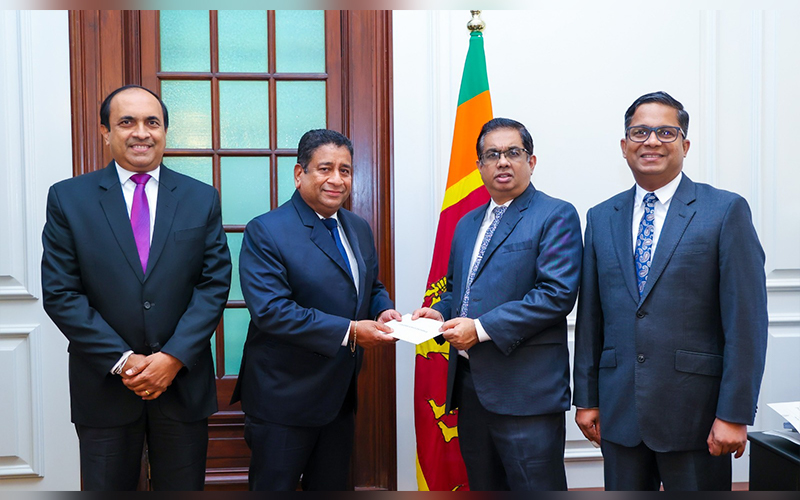
The Colombo Stock Exchange (GL 12) has contributed LKR 25 million to the Rebuilding Sri Lanka Fund.
The cheque was handed over to the Secretary to the President Dr. Nandika Sanath Kumanayake by the Chairman of the Colombo Stock Exchange, Dimuthu Abeyesekera, the Chief Executive Officer Rajeeva Bandaranaike and Senior Vice Chairman Kusal Nissanka at the Presidential Secretariat.
News
Karu argues against scrapping MPs’ pension as many less fortunate members entered Parliament after ’56
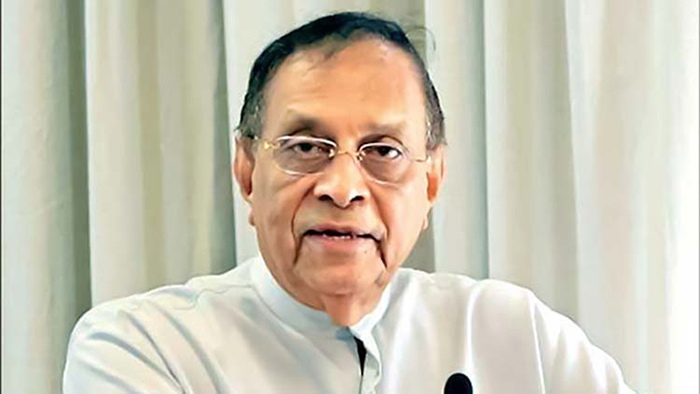
Former Speaker of Parliament Karu Jayasuriya has written to President Anura Kumara Dissanayake expressing concerns over the proposed abolition of MPs’ pensions.The letter was sent in his capacity as Patron of the Former Parliamentarians’ Caucus.
In his letter, Jayasuriya noted that at the time of Sri Lanka’s independence, political participation was largely limited to an educated, affluent land-owning elite. However, he said a significant social transformation took place after 1956, enabling ordinary citizens to enter politics.
He warned that under current conditions, removing parliamentary pensions would effectively confine politics to the wealthy, business interests, individuals engaged in illicit income-generating activities, and well-funded political parties. Such a move, he said, would discourage honest social workers and individuals of modest means from entering public life.
Jayasuriya also pointed out that while a small number of former MPs, including himself, use their pensions for social and charitable purposes, the majority rely on the pension as a primary source of income.
He urged the President to give due consideration to the matter and take appropriate action, particularly as the government prepares to draft a new constitution.The Bill seeking to abolish pensions for Members of Parliament was presented to Parliament on 07 January by Minister of Justice and National Integration Dr. Harshana Nanayakkara.
News
Johnston, two sons and two others further remanded over alleged misuse of vehicle
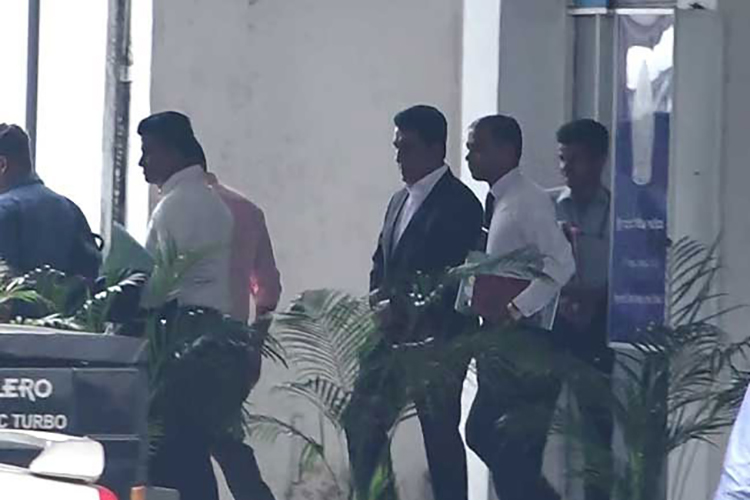
Five suspects, including former Minister Johnston Fernando and his two sons, who were arrested by the Financial Crimes Investigation Division (FCID), were further remanded until 30 January by the Wattala Magistrate’s Court yesterday.
The former Minister’s , sons Johan Fernando and Jerome Kenneth Fernando, and two others, were arrested in connection with the alleged misuse of a Sathosa vehicle during Fernando’s tenure as Minister.
Investigations are currently underway into the alleged misuse of state property, including a lorry belonging to Lanka Sathosa, which reportedly caused a significant financial loss to the state.
In connection with the same incident, Indika Ratnamalala, who served as the Transport Manager of Sathosa during
Fernando’s tenure as Minister of Co-operatives and Internal Trade, was arrested on 04 January.
After being produced before the Wattala Magistrate’s Court, he was ordered to be remanded in custody until 09 January.The former Sathosa Transport Manager was remanded on charges of falsifying documents.
-

 Editorial7 days ago
Editorial7 days agoIllusory rule of law
-

 Features7 days ago
Features7 days agoDaydreams on a winter’s day
-

 Features7 days ago
Features7 days agoSurprise move of both the Minister and myself from Agriculture to Education
-

 Features6 days ago
Features6 days agoExtended mind thesis:A Buddhist perspective
-

 Features7 days ago
Features7 days agoThe Story of Furniture in Sri Lanka
-

 Opinion5 days ago
Opinion5 days agoAmerican rulers’ hatred for Venezuela and its leaders
-
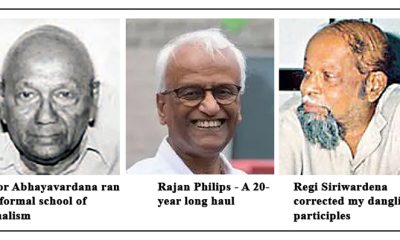
 Features7 days ago
Features7 days agoWriting a Sunday Column for the Island in the Sun
-

 Business3 days ago
Business3 days agoCORALL Conservation Trust Fund – a historic first for SL













